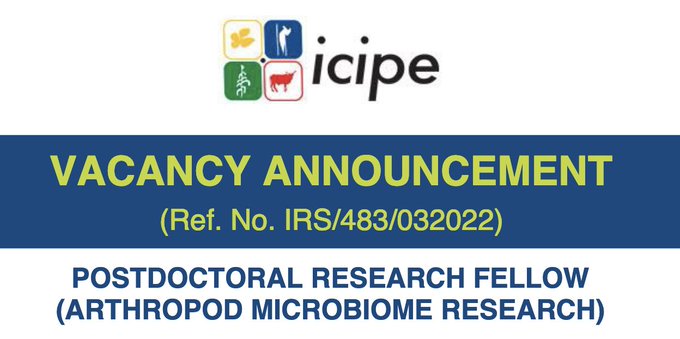Deadline: Open Until Filled
icipe is looking for an outstanding, dynamic and self-motivated Postdoctoral Research Fellow to complement arthropod microbiome research in the Environmental Health Theme, with active collaboration with the Human Health Theme, Molecular Biology and Bioinformatics Unit, and icipe’s One Health agenda.
The candidate should have broad experience in the function of microbiomes in arthropods in diverse ecosystems to enhance animal, environment, human and plant health within the context of one health, in addition to contributing to growing new bioeconomy products from microbes. The candidate should be able to develop and deploy their capabilities to support various programmes and projects, including forging external partnerships with like-minded institutions in the field.
I. Benefits
- A competitive and generous compensation package will be offered to the right candidate for the position based on experience.
- The position is tenable in Nairobi at the icipe Duduville campus.
- The incumbent will receive paid annual vacation, return airfare for themselves and their dependents to their nominated home base each year, and duty-free privileges.
- If the successful candidate is appointed from outside Kenya, he or she will be offered support to relocate to the country and settle in Nairobi, Kenya.
- The position will be offered for an initial contract of 2 years, renewable subject to continued project needs, funding for the position and performance of the staff member.
- The post will be full-time fortheappropriately qualified candidate.
II. Overall purpose of the job
The successful applicant will be responsible for:
- Exploring symbiont biodiversity, functionality, and complexity in arthropods contributing to ecosystem services (including pollinators, edible insects, and natural enemies) and impacting on their pest/vector status.
- Developing predictive capabilities of microbiome function in relation to arthropods and their effects in a wide range of environments.
- Conducting multidisciplinary and integrative analysis of microbiome functions and their interactions with host and environment within the context of One Health.
III. Specific duties
The successful candidate is expected to:▪
- Use cutting-edge sequencing and bioinformatic techniques to assess the biodiversity of microbiomes associated with arthropods.
- Assess co-diversification and interactions between arthropods, their primary symbionts, their secondary facultative symbionts, and their gut microbiota.
- Test transfer of symbionts between arthropod species and the role of host genes in regulating symbiosis in addition to coordination of gene expression and content between symbiont and host.
- Assess the role of symbionts in cytoplasmic incompatibility, fitness, behaviour and paternal transmission of natural enemies.
- Investigate the molecular mechanisms underpinning these phenotypes using a variety of techniques (RNA-seq, proteomics and microbial genetics).
- Decipher the functions of gut microbiome in arthropods, their metabolites on nutritional status, and their interaction with diet.
- Explore the gain/loss of microbe-host association in arthropods in relation to phylogenetic history and correlate with internal and external environmental changes.
- Assess changes in gut microbiomes in relation to changes in biotic or abiotic factors (e.g. invasion, climate and host plants) and theirimpact on ecosystem service contribution.
- Develop standards, protocols, and reference materials for microbiome research and developmentat icipe.
IV. Eligibility
- PhD in Entomology, with expertise in insect microbiome research.
- Proven track record in the area of beneficial insect health research for development,as demonstrated by publication record.
- Evidence ofsecuring external funding to support research.
- Ability to create and foster an innovative work environment, and team building to deliver on agreed goals.▪High degree of organisation, adaptability, and prioritisation.
- Skills in behavioural assays, electrophysiology, mass spectrometry, molecular techniques and working with beekeeper/sericulture farmers.
- Excellent publication track record.
- Experience in capacity building through mentorship of MSc and undergraduate students.
- Excellent communication skills.
V. How To Apply?
- Candidates are required to apply online or by email: [email protected]
- Applicants should submit:
- A confidential cover letter;
- Detailed CV with names and addresses of 3 referees (including e-mail addresses);
- A statement illustrating suitability against the listed qualifications/ competencies/abilities andskills;
- Two published papers
VI. About Icipe
Icipe is apan-Africanand non-profit Centre of Excellence for research and development and capacity building in insect science and its applications. Its mission is to help alleviate poverty, ensure food and nutritional security and improve the overall health status of peoples of the tropics by developing and extending management tools and strategies for harmful and useful arthropods, while preserving the natural resource base through research and capacity building.
Since its establishment in 1970, icipe has become a significant contributor to scientific research and innovative technologies required to meet the health and food security challenges of sub-Saharan Africa. The Centre has achieved this status by developing alternative and environmentally friendly pest and vector management technologies and products that are effective, selective, non-polluting, non-resistance inducing, and a reaffordable to resource-limited rural and urbancommunities.
Icipe is headquartered in Nairobi, Kenya with offices in Ethiopia and Uganda, a major station on the shores of Lake Victoria, and several other field stations inKenya.Employing close to 500 national and international staff, icipe also has approximately 150graduate students who contribute to its research portfolio annually. The Centre currently has operations in more than 40 African countries and thriving partnerships with universities and research organizations across the world.
